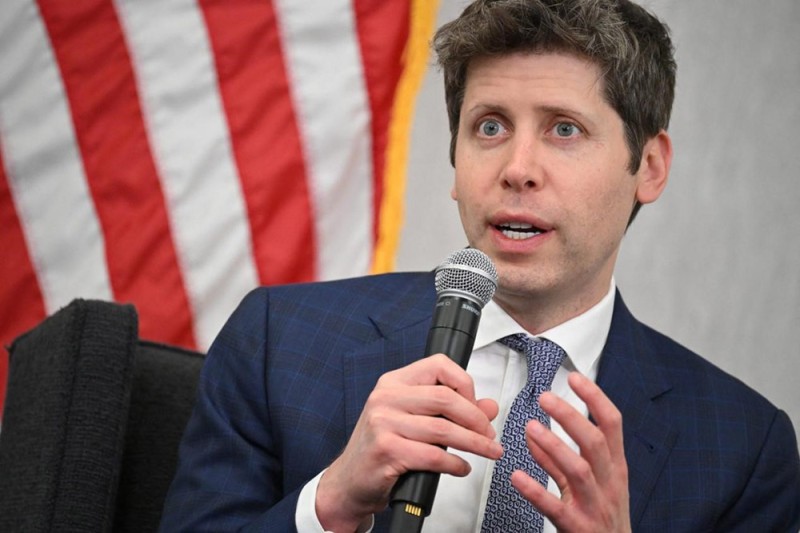
• OpenAI首席执行官山姆·阿尔特曼表示,人工智能将重塑教育模式,并重申了他此前关于大学并非适合所有人的最佳路径的观点。阿尔特曼指出,教育“将呈现出全然不同的面貌”,或许18年后,新一代人将在一个与人工智能紧密相伴、从未脱离其影响的世界中成长。不过,这位首席执行官认为,教育和人类工作不会消失,只会不断演变。
OpenAI首席执行官山姆·阿尔特曼对大学教育持怀疑态度,甚至认为自己的孩子不会上大学。
作为2005年从斯坦福大学辍学的亿万富翁,他时常劝诫年轻人突破大学教育的框架,切勿盲目遵循传统路径。在过往言论中,阿尔特曼曾轻描淡写地谈及自己的辍学决定,称若事情进展不顺,自己随时能重返校园。
早在十多年前,阿尔特曼便一直告诫年轻人,倘若不能全身心投入有价值的项目并结识志存高远之人,就不应上大学。
“大多数人对风险的看法是错误的——例如,留在大学看似是一条毫无风险的道路。然而,在人生最具生产力的四年里一事无成,实际上相当冒险。”他在2013年的一篇博客中写道。
在上周四播出的《This Past Weekend》播客节目中,阿尔特曼在与喜剧演员西奥·冯(Theo Von)的访谈中进一步阐述了自己的观点,直言自己的孩子“可能不会”上大学。
阿尔特曼提到,在年轻人成长过程中不断接触人工智能等前沿新技术的世界里,包括他孩子在内的未来一代,永远无法在智慧层面超越人工智能,也永远不会体验到产品与服务逊色于人类智能。他称,这必将彻底颠覆教育的既有规则。
“在那个世界里,教育将发生天翻地覆的变化。我本就认为大学教育对大多数人而言效果欠佳,若将时间快进至18年后,它将呈现出全然不同的面貌。”他说道。
尽管阿尔特曼向冯表示,自己对技术及其对儿童成长的影响深感担忧,尤其是短视频带来的“多巴胺刺激”,但他指出,人工智能发展带来的真正挑战在于成年人能否跟上步伐。
“其实在我看来,孩子们会安然无恙;真正让我忧心的反倒是家长们。倘若你回顾一下世界历史,就会发现每次新技术涌现,那些与之一同成长的人总能熟练掌握。他们总能想出应对之策,学会从事新工作。但要是你已经年满50岁,还得学习如何用全然不同的方式做事,这往往难以奏效。”他说道。
阿尔特曼澄清道,新技术的出现可能会淘汰部分工作,但更多工作会发生演变而非消失。就像他上初中时谷歌(Google)刚上线一样,如今也有人称人工智能会让教育变得毫无用处。
阿尔特曼并不认同这一观点。相反,他指出新技术只是另一个助力人们更好地思考、提出更优创意并达成新成就的工具。
“我笃定计算器诞生时也出现过类似的情形,人工智能不过是工具链里新添的一员罢了。”他说道。
不过,阿尔特曼提醒道,目前无法预知教育和工作将如何演变,未来会出现哪些职业以及它们会呈现怎样的形态。他坦言,人工智能公司首席执行官这一职位(他目前担任的职位)在过去可能难以想象;甚至OpenAI未来可能会出现人工智能首席执行官,因此他自己的工作也必须做出改变。
不过,阿尔特曼并不认为未来的工作前景一片黯淡,原因在于人类天生具有社会属性,以及看似无限的创造力、追求目标的能力和提升社会地位的动力。
就像工业革命时期的人们可能会认为现代人的生活相对轻松一样,展望100年后的未来,我们或许也会有同样的看法。他表示,无论如何,在他眼中,未来一片光明。
阿尔特曼表示:“我觉得这很美好。在我看来,过去的人相信我们会过上悠然惬意的生活,这是件好事;而我们相信未来的人们会过上轻松自在的生活,这也是件好事。这就是我们所有人共同推动人类进步,让每个人的生活都愈发美满的动人故事。”(*)
译者:中慧言-王芳
• OpenAI首席执行官山姆·阿尔特曼表示,人工智能将重塑教育模式,并重申了他此前关于大学并非适合所有人的最佳路径的观点。阿尔特曼指出,教育“将呈现出全然不同的面貌”,或许18年后,新一代人将在一个与人工智能紧密相伴、从未脱离其影响的世界中成长。不过,这位首席执行官认为,教育和人类工作不会消失,只会不断演变。
OpenAI首席执行官山姆·阿尔特曼对大学教育持怀疑态度,甚至认为自己的孩子不会上大学。
作为2005年从斯坦福大学辍学的亿万富翁,他时常劝诫年轻人突破大学教育的框架,切勿盲目遵循传统路径。在过往言论中,阿尔特曼曾轻描淡写地谈及自己的辍学决定,称若事情进展不顺,自己随时能重返校园。
早在十多年前,阿尔特曼便一直告诫年轻人,倘若不能全身心投入有价值的项目并结识志存高远之人,就不应上大学。
“大多数人对风险的看法是错误的——例如,留在大学看似是一条毫无风险的道路。然而,在人生最具生产力的四年里一事无成,实际上相当冒险。”他在2013年的一篇博客中写道。
在上周四播出的《This Past Weekend》播客节目中,阿尔特曼在与喜剧演员西奥·冯(Theo Von)的访谈中进一步阐述了自己的观点,直言自己的孩子“可能不会”上大学。
阿尔特曼提到,在年轻人成长过程中不断接触人工智能等前沿新技术的世界里,包括他孩子在内的未来一代,永远无法在智慧层面超越人工智能,也永远不会体验到产品与服务逊色于人类智能。他称,这必将彻底颠覆教育的既有规则。
“在那个世界里,教育将发生天翻地覆的变化。我本就认为大学教育对大多数人而言效果欠佳,若将时间快进至18年后,它将呈现出全然不同的面貌。”他说道。
尽管阿尔特曼向冯表示,自己对技术及其对儿童成长的影响深感担忧,尤其是短视频带来的“多巴胺刺激”,但他指出,人工智能发展带来的真正挑战在于成年人能否跟上步伐。
“其实在我看来,孩子们会安然无恙;真正让我忧心的反倒是家长们。倘若你回顾一下世界历史,就会发现每次新技术涌现,那些与之一同成长的人总能熟练掌握。他们总能想出应对之策,学会从事新工作。但要是你已经年满50岁,还得学习如何用全然不同的方式做事,这往往难以奏效。”他说道。
阿尔特曼澄清道,新技术的出现可能会淘汰部分工作,但更多工作会发生演变而非消失。就像他上初中时谷歌(Google)刚上线一样,如今也有人称人工智能会让教育变得毫无用处。
阿尔特曼并不认同这一观点。相反,他指出新技术只是另一个助力人们更好地思考、提出更优创意并达成新成就的工具。
“我笃定计算器诞生时也出现过类似的情形,人工智能不过是工具链里新添的一员罢了。”他说道。
不过,阿尔特曼提醒道,目前无法预知教育和工作将如何演变,未来会出现哪些职业以及它们会呈现怎样的形态。他坦言,人工智能公司首席执行官这一职位(他目前担任的职位)在过去可能难以想象;甚至OpenAI未来可能会出现人工智能首席执行官,因此他自己的工作也必须做出改变。
不过,阿尔特曼并不认为未来的工作前景一片黯淡,原因在于人类天生具有社会属性,以及看似无限的创造力、追求目标的能力和提升社会地位的动力。
就像工业革命时期的人们可能会认为现代人的生活相对轻松一样,展望100年后的未来,我们或许也会有同样的看法。他表示,无论如何,在他眼中,未来一片光明。
阿尔特曼表示:“我觉得这很美好。在我看来,过去的人相信我们会过上悠然惬意的生活,这是件好事;而我们相信未来的人们会过上轻松自在的生活,这也是件好事。这就是我们所有人共同推动人类进步,让每个人的生活都愈发美满的动人故事。”(*)
译者:中慧言-王芳
• OpenAI CEO Sam Altman said AI will change education, and he doubled down on his previous sentiment that college isn’t the best path for everyone. Altman noted education is “going to feel very different” possibly in 18 years when a new generation will have never known a world without AI. However, the CEO claimed education and human jobs won’t go away, but will merely evolve.
OpenAI CEO Sam Altman is so skeptical of college he doesn’t think his own kid will attend.
Having dropped out himself—from Stanford University in 2005—the now-billionaire has often advised young people to look beyond a college education and not automatically follow the traditional path. In previous comments, Altman has downplayed his own decision to drop out, saying he always had the option to return if things didn’t work out.
Dating back more than a decade, Altman has long cautioned that young people shouldn’t go to college without dedicating themselves to worthwhile projects and connecting with ambitious people.
“Most people think about risk the wrong way—for example, staying in college seems like a non-risky path. However, getting nothing done for four of your most productive years is actually pretty risky,” he wrote in a blog post in 2013.
In an interview on the This Past Weekend podcast with comedian Theo Von published Thursday, Altman expanded on his thoughts, claiming his kid would “probably not” go to college.
In a world where young people grow up with new advanced technology such as AI, Altman notes that future kids, including his own, will never be smarter than AI, and will never know a world where products and services aren’t smarter than them. This changes the game for education, he said.
“In that world, education is going to feel very different. I already think college is, like, maybe not working great for most people, but I think if you fast-forward 18 years it’s going to look like a very very different thing,” he said.
While Altman told Von he had “deep worries” about technology and how it is affecting kids and their development, especially the “dopamine hit” of short-form video, he noted the real challenge with advancing AI is whether adults will be able to catch up.
“I actually think the kids will be fine; I’m worried about the parents. If you look at the history of the world when there’s a new technology—people that grow up with it, they’re always fluent. They always figure out what to do. They always learn the new kinds of jobs. But if you’re like a 50-year-old and you have to kind of learn how to do things in a very different way, that doesn’t always work,” he said.
Altman clarified the advent of new technology will likely eliminate some jobs, but many more jobs will evolve rather than disappear. Just like when Google first came online when he was in junior high, some are also now claiming education may become useless thanks to AI.
Altman doesn’t buy into this idea. Rather, he points to new tech as yet another tool that helps people think better, come up with better ideas, and do new things.
“I’m sure the same thing happened with the calculator before, and now this is just a new tool that exists in the tool chain,” he said.
However, Altman cautioned, it’s impossible to know how education and jobs will evolve and which roles will exist in the future, and how. He noted his own job as CEO of an AI company would likely have been unimaginable in the past. An AI CEO may even be on the horizon for OpenAI, he said, and therefore his own job would have to change.
Altman isn’t a doomer about the future of work, though, because of the innate social nature of humans and their seemingly limitless capacity for creativity, purpose-seeking, and improving their social status.
In the same way people from the time of the Industrial Revolution might have viewed modern humans as leading a relatively easy existence, looking forward 100 years from now, we may well think the same thing. Either way, he said, he sees a bright future ahead.
“I think that’s beautiful. I think it’s great that those people in the past think we have it so easy. I think it’s great that we think those people in the future have it so easy,” Altman said. “That is the beautiful story of us all contributing to human progress and everybody’s lives getting better and better.”

